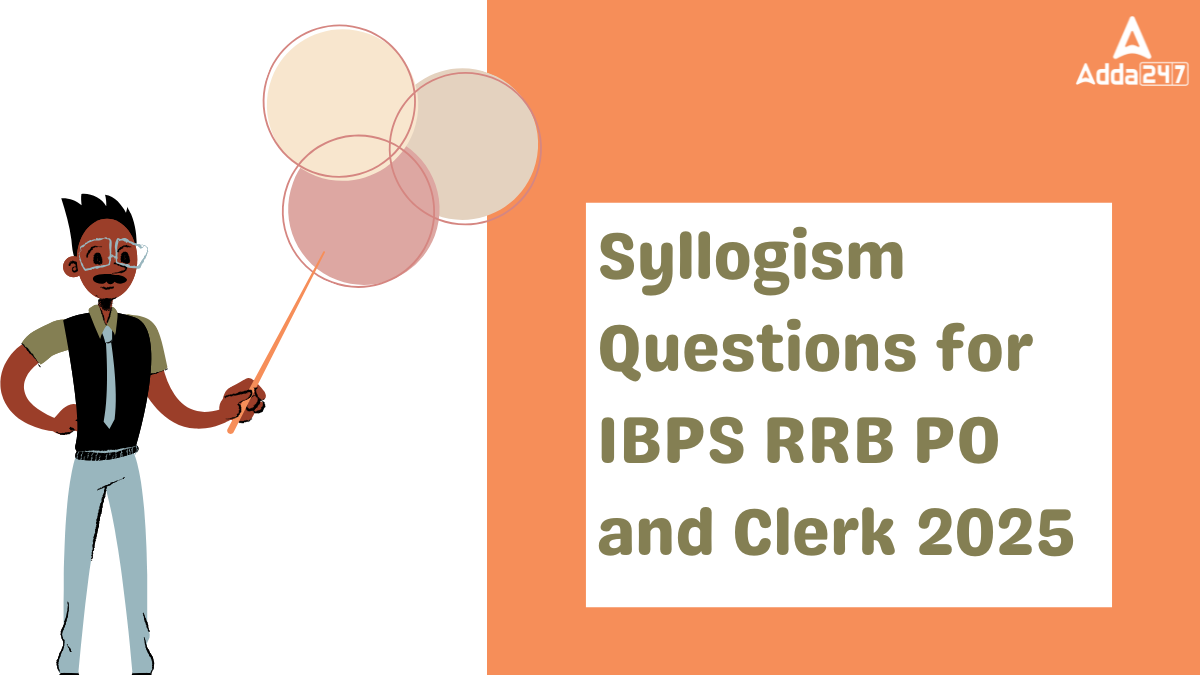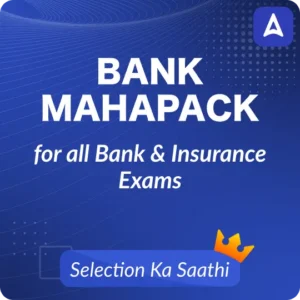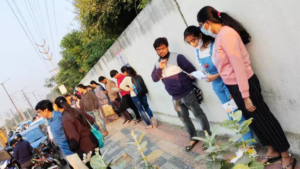Syllogism is one of the most frequently asked topics in the Reasoning Ability section of both IBPS RRB PO and Clerk exams. It is a part of the logical reasoning segment and primarily tests a candidate’s ability to understand and analyse given statements and derive conclusions based on them. As the IBPS RRB 2025 exam approaches, mastering syllogism can help you secure crucial marks in a limited time.
Syllogism for IBPS RRB PO and Clerk 2025
Syllogism questions generally appear in sets of 4-5 questions in the prelims and even in the mains exam of IBPS RRB, especially under the logical reasoning section. These questions are known for being both scoring and time-efficient if approached with the right method. They assess your logical thinking, pattern recognition, and command over basic deductive logic.
Best Approach to Solve Syllogism Questions
Understand Keywords: Learn how to interpret terms like All, Some, No, Some not, Only, and Only a few. These carry specific logical meanings and cannot be interchanged.
Use Venn Diagrams: Visual representation through Venn diagrams helps clarify relationships between different sets, reducing the chance of confusion.
Practice with New Patterns: The IBPS RRB exam has occasionally introduced unconventional patterns. Make sure to practice a variety of question types to build adaptability.
Avoid Assumptions: Stick strictly to the information given. Do not bring in external logic or assumptions.
Time Management: Allocate not more than 5-6 minutes for syllogism sets in the prelims. In the mains, it depends on the overall paper complexity.
Syllogism Questions for IBPS RRB PO and Clerk 2025
Directions (01-05): In each of the questions below are given some statements followed by some Conclusions. You have to take the given statements to be true even, if they seem to be at variance from commonly known facts. Read all the conclusions and then decide which of the given conclusions logically follows from the given statements disregarding commonly known facts.
(a) If only conclusion I follows.
(b) If only conclusion II follows.
(c) If either conclusion I or II follows.
(d) If neither conclusion I nor II follows.
(e) If both conclusions I and II follow.
Q01. Statements:
Some Tom are Jerry
All Jerry are Cat
All cat are Animal
Conclusions:
I: Some Tom are not Animals
II: All Tom are animals
Q02. Statements:
Some Boy are Cricketer
All Cricketer are Batsman
No Boy is Bowler
Conclusions:
I: Some Cricketer is not bowler
II: All Batsman can never be bowler
Q03. Statements:
All coffee are summer
Some tea is coffee
Some summer are cold
Conclusions:
I. All tea being cold is a possibility
II. Some coffee are definitely not cold.
Q04. Statements:
Some blue are green
Some grey is blue
All green are white
Conclusions:
I. Some grey is white is a possibility
II. All green are grey is a possibility
Q05. Statements:
All soil are plant
No earth is plant
All earth are water
Conclusions:
I. Some plant is water is a possibility
II. No water is soil
Directions (06-10): In each question below are given some statements followed by some conclusions. You have to assume everything in the statements to be true even if they seem to be at variance with commonly known facts and then find out which of the two given conclusions logically follow from the statements, disregarding commonly known facts. Give Answer-
(a) Only I follow
(b) Only II follows
(c) Either I and II follow
(d) Both I and II follows
(e) Neither I nor II follows
Q06. Statements:
Some selection are job.
Some exam are result.
No result is selection.
Conclusions:
I. Some exam are not selection.
II. All selection can be exam.
Q07. Statements:
All Blue are Purple.
Some Purple are not White.
All White are Black.
Conclusions:
I. Some Purple are Blue.
II. All White is purple is a possibility.
Q08. Statements:
No Game is a Quiz.
Some Quiz are Trick.
All Trick are Boat.
Conclusions:
I. Some Boat are quiz
II. Some trick are not game
Q09. Statements:
All water are Rain.
No Rain is Pure.
All Pure are Sun.
Conclusions:
I. No water are Pure.
II. Some Rain are sun.
Q10. Statements:
All Plant are Flower.
All flower are fruit.
Some fruit are light.
Conclusions:
I. No flower is light
II. Some flower are light
Directions (11-15): In each of the questions below are given some statements followed by some Conclusions. You have to take the given statements to be true even, if they seem to be at variance from commonly known facts. Read all the conclusions and then decide which of the given conclusions logically follows from the given statements disregarding commonly known facts.
Q11. Statements:
All Human are Being
No Road is garden
Some garden are Being
Conclusions:
I. Some garden are not road
II. Some human are not road.
(a) Either I or II follows.
(b) Both I and II follow.
(c) Only I follows.
(d) Neither I nor II follows.
(e) Only II follows.
Q12. Statements:
Only a few mango are orange
Only oranges are grapes
No Orange is a tomato.
Conclusions:
I. All mango can be orange
II. Some Mango is not tomato.
(a) Either I or II follows.
(b) Both I and II follow.
(c) Neither I nor II follows.
(d) Only I follow.
(e) Only II follows.
Q13. Statements:
All Men are Strong.
Only a few Strong is Solider.
Only Solider are Army.
Conclusions:
I. Some army can be Strong is a possibility.
II. All men can be solider.
(a) Either I or II follows.
(b) Both I and II follow.
(c) Neither I nor II follows.
(d) Only I follow.
(e) Only II follows.
Q14. Statements:
All Sweet are Toast.
All Toast are Tasty.
All Tasty are Travel
Conclusions:
I. Some Travel are Sweet
II. All Tasty is Toast is a possibility.
III. All Travel are Tasty .
(a) I and II follow
(b) I and III follow
(c) II and III follow
(d) All follow
(e) None of these
Q15. Statements:
No Tool is Forest.
Some Tool are Table.
All Tool are Nano.
Conclusions:
I. All table are Nano
II. Some Nano are not forest
III. Some forest are Nano.
(a) Only I follows
(b) Only II follows
(c) Only III follows `
(d) Either I or III follows
(e) None of these
Tips to Prepare Syllogism for IBPS RRB 2025
Practice Daily: Regular practice with different types of questions will help you spot patterns faster.
Analyse Mistakes: After solving practice questions or mock tests, analyse your errors and understand the logic behind the correct answer.
Revise Theory: Refresh your basics of logical reasoning, set theory, and syllogism rules.
Use Quality Resources: Refer to updated mock tests and past year papers to stay in line with the exam level.
Attempt Sectional Tests: Take mini-tests focusing only on reasoning to develop accuracy and speed under time constraints.





 NABARD Development Assistant Cut Off 202...
NABARD Development Assistant Cut Off 202...
 NABARD Development Assistant Exam Analys...
NABARD Development Assistant Exam Analys...
 NABARD Development Assistant Prelims Exa...
NABARD Development Assistant Prelims Exa...








